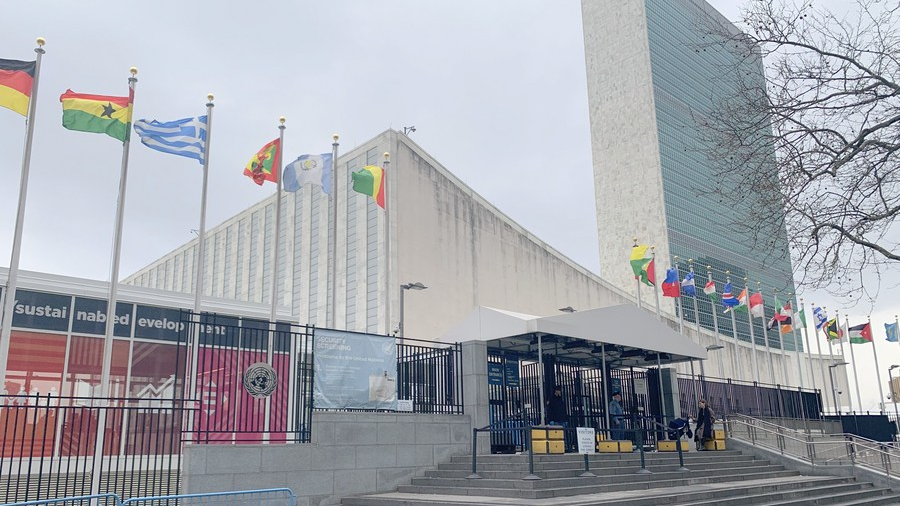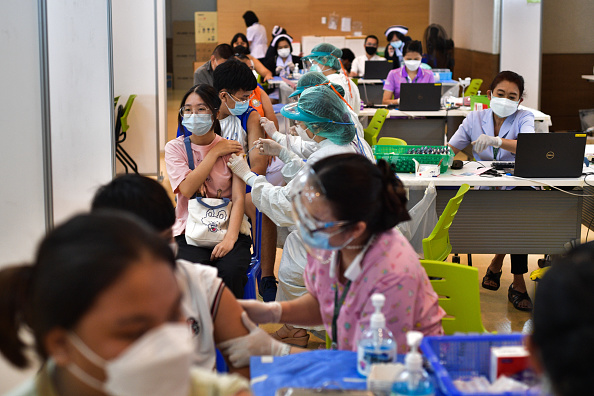
The visitors' entrance to UN headquarters in New York, U.S. /Xinhua
The visitors' entrance to UN headquarters in New York, U.S. /Xinhua
Editor's note: Stephen Ndegwa is a Nairobi-based communication expert, lecturer-scholar at the United States International University-Africa, author and international affairs columnist. The article reflects the author's opinions and not necessarily the views of CGTN.
The General Debate of the 76th session of the United Nations General Assembly (UNGA) is underway in New York. As the main agenda-setting organ of the UN, the deliberations and outcomes of this veritable global meeting elicit a lot of interest and curiosity alike.
With the world facing unprecedented and seemingly insurmountable challenges in recent years, which have peaked with the COVID-19 pandemic, the UN is the last hope to help us avoid reaching the tipping point. There seems to be no relenting in the downward spiral, with climate change gradually taking up the space left by the plateauing pandemic.
Among other issues, UNGA 2021 is expected to discuss the fight against COVID-19, inequality, justice and climate change. Now, the common denominator in all these and other issues that will be canvassed is global peace. The establishment today is unfair to countries and regions that do not serve the strategic interests of hegemonic entities and those without sufficient resources to mitigate the ripple effects of the negative actions of those with superpower status.
By coincidence, the UNGA is gathering at a time the world is marking the International Day of Peace, which is celebrated annually on September 21. This year's theme is "Recovering better for an equitable and sustainable world."
Peace is not necessarily the absence of war. By its definition, peace is an all-encompassing state of being that includes friendship and harmony, and freedom from fear of violence. The practice of these values by the international community would create a world with benefits for humanity, with every significant player considering win-win outcomes in every endeavor.

Thais receive doses of vaccine at Vajira Hospital in Bangkok, Thailand, September 21, 2021. /Getty
Thais receive doses of vaccine at Vajira Hospital in Bangkok, Thailand, September 21, 2021. /Getty
For instance, the ongoing controversies surrounding COVID-19 vaccines have created angst due to the "vaccine colonialism" practiced by some countries with the wherewithal against those with no capacity to produce their own. This has become a source of conflict and thus a hindrance to peaceful coexistence between the haves and have-nots.
Experience shows that there cannot be sustainable development in human pursuit without the enjoyment of peace dividends. No country or its people can achieve their full potential in an environment characterized by tension, which is usually a precursor to violence. The most peaceful countries have the highest indexes of human development.
According to Global Finance magazine, "these virtuous nations also enjoy greater income growth, a stronger currency and higher foreign investment – not to mention better political stability and stronger correlation with the individual level of perceived happiness."
Conversely, the 2021 Global Peace Index quantified the economic impact of violence – in 2020 the total cost amounted to $14.9 trillion in purchasing power parity terms, or to 11.6 percent of the total global gross domestic product. The human cost of the world's refugee crisis is part of this calculation.
Over the years, the UN has become synonymous with long-term international peacekeeping missions and operations mandated by the UNGA or the Security Council, in particular. Unfortunately, this UN mandate has been hijacked and misused to advance courses that do not serve the common good. It is ironic that while the UN was an initiative of the West in order to prevent further world wars, the West's hegemonic tendencies are now to blame for much of the socio-economic and political upheavals that threaten world peace.
Many of the U.S.-led peacekeeping missions have been a flop and often resulted in exacerbating the problems they have ostensibly set out to solve. Peace-building should start from the level of good governance, both nationally and internationally. Powerful countries must stop meddling in the internal affairs of those they deem as weak or in pursuit of "geopolitical dominance" and other exploitative objectives. Again, the Western alliance is culpable here with its interventions gone awry in almost every region in the Global South. Such aftermath has created wastelands and left millions poor, dead or maimed.
Ultimately, the UN needs to be mandated to enforce peace rather than purport to mediate warring parties without effective forceful intervention. According to Professor Dennis Jett of Penn State University, peacekeeping missions fail because "UN peacekeeping has become a way for rich countries to send the soldiers of poor countries to deal with conflicts the rich countries do not care all that much about." He says that the international community should deploy troops that are both capable and willing to impose peace.
(If you want to contribute and have specific expertise, please contact us at opinions@cgtn.com.)

